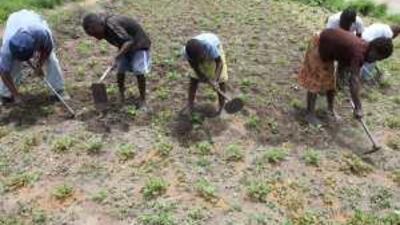HARARE // When the finance minister, Tendai Biti, assumed office in a unity government formed in February 2009, he took over stewardship of a contracting economy, saddled with a US$5.7 billion (Dh20.9bn) debt owed to international financial institutions.
Mr Biti advanced what has turned out to be a contentious proposal that Zimbabwe apply to the International Monetary Fund (IMF) and World Bank for the Highly Indebted Poor Country (HIPC) status. "The status will help spur economic growth," Mr Biti told journalists recently after meeting Africa Development Bank officials in Harare. "There is a huge opportunity cost Zimbabwe is suffering as a result of the stifling debt. Without the debt overhang we would be growing by 15 per cent annually. There is no consensus position yet, but I've said give me an alternative that allows us to get this debt serviced without prejudicing our meagre resources."
The IMF and World Bank came up with the HIPC initiative in 1996 as a way through which donors could write off or reduce debts of the world's highly indebted poor countries. The removal of the debts, the initiative says, unlocks funds for social development programmes in qualifying countries. Forty developing countries, of which 29 are in sub-Saharan Africa, have HIPC status. For a country to attain HIPC status, it has to meet some stringent requirements. It must establish a record of reform and sound policy implementation managed by the IMF and have an unsustainable debt burden, beyond traditionally available debt-relief mechanisms.
Furthermore, the country must have a per-capita income of less than $1,095. Zimbabwe's per capita income is $237, according to the World Bank. Eric Bloch, an economist, said Zimbabwe meets two of the above requirements - it has no capacity to clear the debts and has a low per-capita income. The HIPC route is the only practical way to go, he said. "What viable option do they have for the country to deal with this huge debt?" said Mr Bloch to opponents of the proposal.
The country's debt problem is another illustration of the economic crisis, which started in 1998 when Robert Mugabe, the president, sent troops to support the then Democratic Republic of Congo government of Laurent Kabila against rebels. Two years later, he launched a programme to seize white-owned farms for reallocation to landless blacks. The unplanned military expenditure destabilised the budget. The land reforms disrupted the agricultural sector, scaring away foreign investors and leaving the economy in trouble.
Hopes for more meaningful re-engagement with the international community and economic recovery were raised after Mr Mugabe formed the unity government last year. Indeed last month, the IMF restored Zimbabwe's voting rights after a seven-year suspension but ruled out any immediate extension of loans citing political factors. The IMF managing director Dominique Strauss-Kahn reiterated that position recently: "The problem in a country like Zimbabwe is not only an economic problem. It's mostly a political problem," he said
Mr Biti's HIPC suggestion has divided the unity government and public opinion. The Zimbabwe Coalition on Debt and Development, (ZimCODD), an organisation promoting social and economic justice, said the debt could rise to $7bn by next year if it is not reduced immediately. Speaking at the launch of a ZimCODD grassroots programme on public debt on March 11, Privilege Hang'andu, a representative from the Jesuit Centre for Theological Reflection in Zambia, warned Zimbabwe against taking the HIPC route as Zambia had done.
Cutbacks on education and health, he said, were "forced on the country" despite the fact that 65 per cent of the population was living in abject poverty. Lovemore Matombo, the president of the Zimbabwe Congress of Trade Unions, said international financial institutions focus on protecting the business interests of western countries, not to develop Africa. "There is no country in the world that has developed under IMF and World Bank programmes. Inviting HIPC in Zimbabwe is inviting cancer," he said.
Gilbert Muponda, a Zimbabwean economist at UK-based GMRI Capital said in an opinion piece on www.zimtelegraph.com that mineral-rich Zimbabwe can use its resources to clear the debts. "Zimbabwe needs to think long and hard before throwing itself further into IMF- and World Bank-engineered structures and schemes," he said. "Zimbabwe is a resource-rich nation and should focus on properly accounting for its wealth and resources in a manner that creates wealth plus service its debt. The focus on seeking debt forgiveness only will result in the country becoming donor dependent, weak and poor."
foreign.desk@thenational.ae

